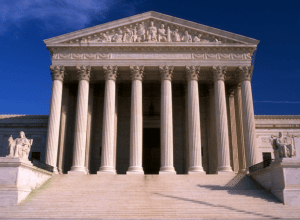The fate of corporate whistleblowers and compliance programs is on the line as the U.S. Supreme Court reviews the case of Digital Realty Trust V. Somers. At issue in this case is whether whistleblowers who report potential violations within their organizations, as opposed to reporting directly to the U.S. Securities and Exchange Commission (SEC), are protected under the Dodd-Frank Act (DFA).
The circuit courts have been split on this issue, therefore the Supreme Court’s decision is crucial to resolving this question. If the Court rules in favor of Digital Realty, it will not only adversely impact cases of corporate retaliation, but also those that arise under numerous whistleblower laws that define protected activity similarly to the DFA, such as the Clean Air Act, the Federal Water Pollution Control Act, the Surface Mining Act and the banking whistleblower laws.
Wall Street’s hostility towards whistleblowers has been front and center as the U.S. Chamber of Commerce and its 40,000 members have supported numerous corporations such as General Electric, Apple Inc., UBS, and others in challenging the DFA’s definition of “whistleblower”, even when it means fighting their own compliance programs.
The National Whistleblower Center (NWC) announced that it will weigh in on this critical case by filing an amicus curiae (or Friend of the Court) brief urging the Supreme Court to fully protect internal whistleblowers. If the Court should side with Digital Realty, “the results will be catastrophic, not only for the employees who lose their jobs for trying to do the right thing, but also for investors. Corporate compliance programs will be dead, and their reputations forever tarnished,” according to an article published in Law360, by leading whistleblower attorney and NWC Executive Director Stephen M. Kohn.
“The hostility exhibited by numerous corporations and the Chamber of Commerce cannot be ignored. It exposes deep-seated hostility both to whistleblowers and corporate compliance programs” said Kohn.
Protecting whistleblowers is essential in fighting fraud and corruption. Regardless of whether an employee reports misconduct internally or externally, they should be protected from backlash for doing the right thing.
The NWC has created a “Friend of the Court Fund” to support its efforts to protect the brave individuals who stand up despite the strong anti-whistleblower corporate culture! Donations to this fund will help the NWC cover the costs associated with filing amicus briefs. Donate to the NWC’s ‘Friend of the Court Fund’ now to tell corporate America to stop persecuting whistleblowers!
Further Reading:
Digital Realty Trust V. Somers May Kill Corporate Compliance
Clarifying Anti-Retaliation Protections Under Dodd-Frank
Somers v. Digital Realty Trust (9th Cir. 2017)
Chamber of Commerce Brief urging the Court to strip internal whistleblowers from DFA.
